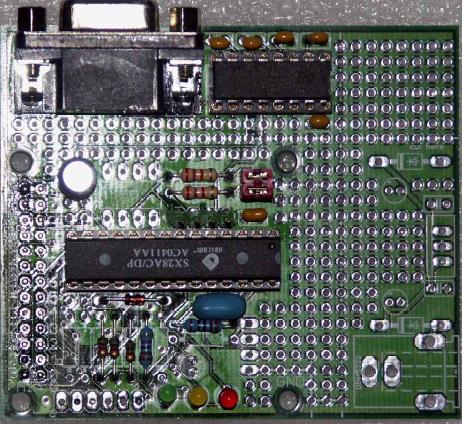
RpS i 2o3i2c |

RS-232: This adapter provides an easy-to use interface between devices on an I²C bus and an RS-232 serial communications port. It can be used to control external components via the I²C bus using simple command sequences sent and received via an RS-232 port from an application running on a PC (sample Visual Basic application with source code is included), PDA, or other platform. The on-board MAX-232 level shifter insures there will be no signal level problems and allows for maximum cable length. For TTL level serial applications, the level shifter can be bypassed or even broken away. The serial port operates at 112.5 kBaud, 8 bits, no parity, one stop bit. There are no handshake lines required. The cable for a PC serial port is "straight through" rather than null modem.
I²C Bus Master: The RS-232 / I²C-Adapter acts as an I²C master, and can perform the most frequently used read/write operations via the bus without the need for the application software to handle the I²C protocol. When the application sends one of the "macro command sequences", the adapter takes care of generating the start condition, transmitting the address plus the R/W bit, transmitting/receiving data bytes plus setting/reading the acknowledge bit, and finally generating the stop condition. All of this is transparent to the application software. Results up to 16 bytes long can be returned along with a status letter to indicate errors or a successful reply.
I²C low-level: To ensure compatibility, the adapter also allows the application software to directly "talk" to the I²C bus in order to allow communications with I²C devices that require non-standard sequences. Using these "low-level commands" any number of data bytes can be transferred to or from the I2C device.
I²C Monitor: In its Monitor mode, the module acts as an I²C "spy", i.e. it passively monitors an I²C bus, and sends the byte data transferred via the bus together with the information, and if there was an acknowledge, or not via RS-232. An internal 32-byte FIFO buffer, together with an 115.2 kBaud RS-232 rate allows for I²C bus rates of up to 100 kBit/s to be monitored.
General Purpose I/O: There are also five non-isolated outputs, and eight non-isolated inputs that can be set/read by specific adapter commands. The inputs also clock eight individual 16-bit counters that may be read/reset by designated adapter commands. The inputs are sampled at a rate of about 1 MHz, and are not internally de-bounced.
Reliable WDT: As an additional option, a timer may be activated that resets the I²C-Adapter when new commands are not received within the specified time-out period.
Status Indicators: Thee LEDs are used to indicate the status of the RS-232/I²C-Adapter, the activities on the I²C bus, and the RS-232 lines.
The RS-232/I²C-Adapter is based upon a Ubicom/Parallax SX-28 microcontroller, clocked at 50 MHz. Single, pre-programmed chips are available for customers who want to integrate the RS-232/I²C-Adapter's functionality into their own hardware design (see below).
For more information please see the Manual
All modules are shipped with a CD-ROM containing the documentation, schematics, assembly instructions, and the sample VB application project.
Sadly, contact with the supplier of this device has been unsuccessful for several years. Emails are not returned. Perhaps you will have better luck than I: